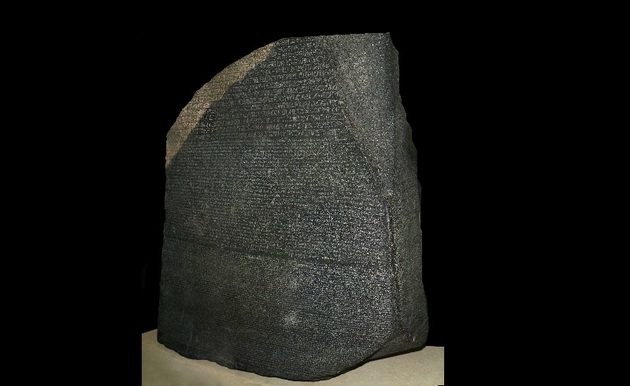A group of Egyptian archaeologists launched in mid-September a public campaign to reclaim the Rosetta stone from the British Museum, which it acquired under the Treaty of Alexandria in 1801. The campaign coincides with the 200th anniversary of the deciphering of the Rosetta stone, which opened the door to the emergence of Egyptology, Al-Monitor writes.
The Rosetta stone is a black granite stele (slab) dating back to 196 B.C., bearing a text written in hieroglyphic, demotic and ancient Greek. It was discovered in 1799 during the French campaign against Egypt. In 1822, French scientist Jean-François Champollion deciphered the mystery of hieroglyphic writing in terms of its linguistic structure and vocal compositions thanks to the stone. Before that, life in ancient Egypt had been a puzzle for archaeologists for thousands of years. The Rosetta stone arrived at the British Museum in 1802 under the Treaty of Alexandria signed in 1801 between the French and the English armies, which resulted in the evacuation of the French forces from Egypt. The treaty also stipulated in its 16th article that it was forbidden to transfer any ancient Egyptian artifacts to France, which is how the British acquired the Rosetta stone. Monica Hanna, acting dean of the Faculty of Archaeology at the Arab Academy for Science, Technology and Maritime Transport in Aswan, and one of the leaders of the campaign to reclaim the Rosetta stone from the British Museum, told Al-Monitor that the campaign organizers launched an online petition that has so far collected more than 2,500 signatures. Hanna said the aim behind the campaign is to raise people’s awareness of the theft of antiquities in Egypt. She added that the Public Prosecution, which is entrusted with recovering stolen Egyptian antiquities, is communicating with the campaign organizers and has welcomed their request. She explained that after the completion of the campaign, the signatures will be submitted to the public prosecutor, who will deliver them to the government, in turn, communicating with the British Museum to convey the popular demand for the return of the Rosetta stone and 17 other artifacts.
Egypt has repeatedly demanded the reclamation of the Rosetta stone. Back in 2018, then-Minister of Tourism and Antiquities Khaled al-Anani said that international law, specifically the UNESCO Convention of 1990, had impeded the recovery of many looted Egyptian antiquities.
But this time, Hanna is counting on changing the moral code of museums, which are now returning some artifacts to countries that were previously occupied. She stressed that the Rosetta stone is destined to return to Egypt because it was moved to England in violation of European laws that were applied at the time of signing the Alexandria Treaty. These laws, she said, stipulated the protection of people’s cultural property and not considering them as spoils of war.
Egyptian archaeologist Zahi Hawass also launched another campaign to collect signatures to retrieve the Rosetta stone. Speaking to Al-Monitor, Hawass said that the stone was moved out of Egypt illegally, and it is time for it to return to its natural place in the Grand Egyptian Museum, which is scheduled to open at the end of this year.
To celebrate the 200th anniversary of the deciphering of the stone, the British Museum will hold a large exhibition titled “Hieroglyphs: Unlocking Ancient Egypt,” from Oct. 13, 2022, to Feb. 19, 2023. Egypt also held a celebration on the same occasion on Sept. 27 at the Egyptian Museum in Tahrir Square in downtown Cairo.
Egypt attaches great importance to the return of stolen artifacts to boost its tourism sector, which generates hard currency. According to a report published by the magazine Egyptian Geographic, there are about 1 million Egyptian artifacts decorating 40 famous museums around the world.






